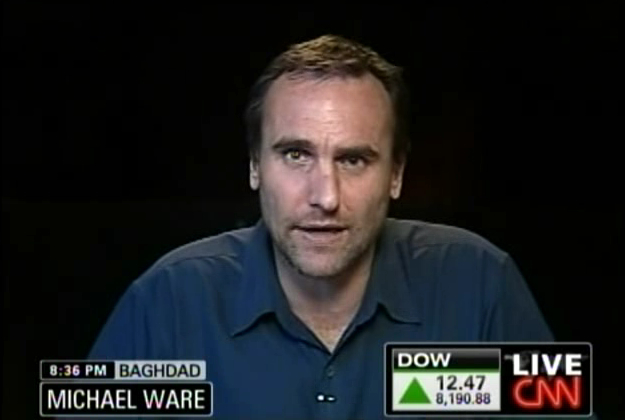NR: "This isn't an uptick or a surge in violence."
Thursday, July 09, 2009

Length: 2:32
LARGE (29.4 MB) ----- SMALL (3.1 MB)
Domestic finally gets its first discussion of the multiple bombings, and Michael starts right out by saying that it is NOT a "surge" of violence, but just what passes for normal in Iraq. (But with an emphasis on Thursdays, for some reason.) Kudos to Ali Velshi for calling out the banner graphic as being wrong.
ALI VELSHI: Let's take it over to Iraq. A surge in violence just days after American troops have pulled out of the major cities there. CNN's Michael Ware is with us now from Baghdad -- Michael.
MICHAEL WARE, CNN CORRESPONDENT: Yes, Ali, look, what I have to say is that this isn't an uptick or a surge in violence. This is part of a long-running, sustained campaign.
What we've had today in the last 24 hours, is that at least 61 Iraqis, mostly civilians, have been slaughtered in suicide bombings, other sorts of bombings, and other attacks.
Now, the most spectacular, as the word is used in military parlance, occurred at about 7:30 a.m. local time or thereabouts up in the northern city of Tal Afar. 35 people were killed according to government officials when there was a coordinated double suicide bombing operation. The first one went in, targeting what we're told was a counterterrorism official. Then as rescuers surged in, a very common tactic, the second suicide bomber struck.
Elsewhere, in the capital, Baghdad, around about the same time, early morning, seven people were killed in the Shia stronghold of Sadr City when a bomb detonated there. Last evening, within the 24 hours, another suicide bomber killed two at the wedding of a police officer.
So, this has been ongoing. And let's remember, the Iraqis are now in command. But this was also happening under U.S. command just 10 days ago. The last week of a --
VELSHI: So, I just want to ask you this -- Michael, let me ask you this.
WARE: Yes.
VELSHI: On the banner underneath you, it says surge of violence in Iraq. And your first words were, it's not a surge. So what you're saying is it's stuff that was happening.
WARE: It's not, it's not. Yes, this is the nature of Iraq. People's eyes may be turned away. People may think the troops have left. Indeed people say that to me. We still have soldiers there? Soldiers tell me that folks are going back home, oh, we've still got troops in Iraq? Yes, you do. And there's still a war here.
Now, it's being run by the Iraqis. But these bombings happen frequently. It's like an almost regular tempo, particularly on a Thursday, for some reason. So this in no way is an isolated incident.
VELSHI: Okay. All right. Well, that's why it's good to have you there because you can keep your pulse on it. It does appear, I think, when we see it sometimes to the untrained eye that that appears to be a surge related to U.S. troops coming out.
Thanks for clearing up that it is sort of more of the same. But Michael, thank you very much.
Michael Ware, for us in Baghdad.
